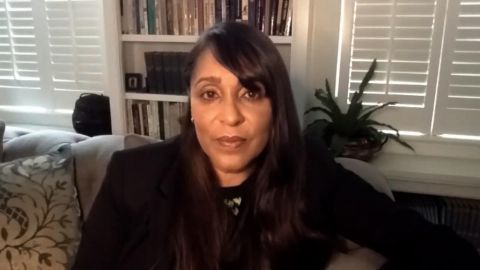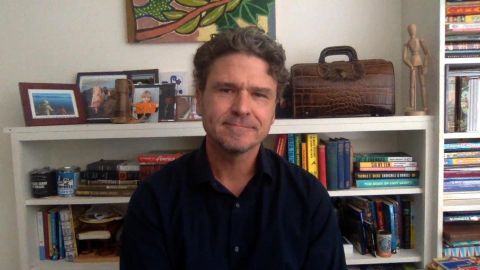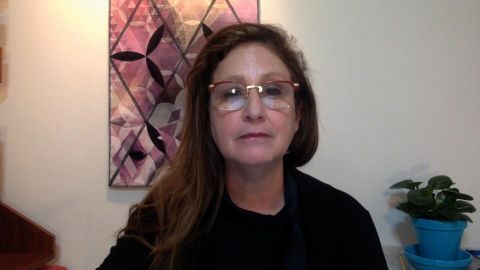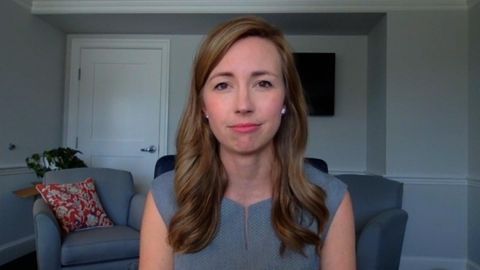Read Transcript EXPAND
CHRISTIANE AMANPOUR: Now, October is Domestic Violence Awareness Month. And, as we have reported, this cruelty has surged around the world, along with the pandemic, due to mandatory lockdowns, with abuser and victim trapped inside together. Our next guest knows firsthand the devastating impact of violence in the home. Pulitzer Prize-winning poet Natasha Trethewey was 19 when her stepfather murdered her mother. This excruciating pain is the subject of her new book, “Memorial Drive: A Daughter’s Memoir.” She also writes about growing up in the ’60s in the Deep South as a mixed-race child. And here she is in a raw and often emotional conversation with our Michel Martin.
MICHEL MARTIN: Thanks, Christiane. Natasha Trethewey, thank you so much for joining us.
NATASHA TRETHEWEY, FORMER U.S. POET LAUREATE: Thank you for having me.
MARTIN: I think many people are familiar with your work. You have won multiple awards. You’re a respected, highly sought-after college professor, teacher, former poet laureate of the United States, a high honor. I feel comfortable in saying that I’m sure millions of people know your work. And I remember reading a brief biography of you. It said, her father, Eric Trethewey, was a poet. Her mother died when she was in college. Her mother died when she was in college. So, just to get to the core terrible details, your stepfather, your mother’s ex-husband, who had physically abused her, and, frankly, if I may say, emotionally abused you, killed her when you were only 19 years old and when she was 40. She had finally gotten free of him. And, frankly, he seems to have been threatening her for years, from what I can see. Why this book now? Did this book sort of force its way out of you? Why this book and why now?
TRETHEWEY: I think it did. I have been carrying this grief with me now for 35 years. And more and more, my mother was being erased. This erasure was ongoing. It was particularly easy for people, as I said, to draw this line straight through my father to me, because my father was a poet. My father was also my white parent. So there was something both racial — racialized and patriarchal in this assumption that I’m who I am because of my father. And it wounded me deeply that people didn’t understand that the thing that hurt me into poetry, that the thing that I had tried to contend with my whole adult life was the loss of my mother. I felt like I needed to tell that story and to place who she was and what she meant to me in its proper perspective.
MARTIN: The title of your book, of course, is “Memorial Drive.” And it comes at this remarkable moment of reckoning for the country, where this country is reckoning with its racial past, as it does periodically. And one of the remarkable things about your book is the way it intertwines your personal history with that of the history of the South and of the country. To that end, I just wanted to ask if you wouldn’t mind reading a passage for us from…
TRETHEWEY: Oh, of course, I’d be happy to. This is from the first chapter, which is called “Another Country.” “In the spring of 1966, when I was born, my mother was a couple of months shy of her 22nd birthday. My father was out of town traveling for work, so she made the short trip from my grandmother’s house to Gulfport Memorial Hospital, as planned, without him. “On her way to the segregated ward, she could not help but take in the tenor of the day, witnessing the barrage of rebel flags lining the streets, private citizens, lawmakers, Klansmen, often one and the same, raising them in Gulfport and small towns all across Mississippi. “She could not have missed the paradox of my birth on that particular day, a child of miscegenation, an interracial marriage still illegal in Mississippi, and as many as 20 other states. Sequestered on the colored floor, my mother knew the country was changing, but slowly. She had come of age in the summer of 1965, turning 21 in the wake of Bloody Sunday, the Watts riots, and years of racially motivated murders in Mississippi. “Unlike my father, who’d grown up a white boy in rural Nova Scotia hunting and fishing, free to roam the open woods, my mother had come into being a black girl in the Deep South, hemmed in, bound to a world circumscribed by Jim Crow. “Though my father believed in the idea of living dangerously, the necessity of taking risks, my mother had witnessed the necessity of dissembling, the art of making of one’s face an inscrutable mass before whites who expected of blacks a servile deference.”
MARTIN: It’s always tricky asking our artists how she makes her art. But I am wondering how you arrive at this voice, how you arrive at this kind of intertwining of the personal with the social story, the mixing of the races, the expectation of white supremacy, expectation of deference? Was it hard?
TRETHEWEY: Well, it took a long time to write this book. It took me seven years to write the book. And I think part of the hardest thing was to figure out the voice. Who am I in telling this story? And what is the story that needs to be told? I mean, because there are obviously the tragic facts of my mother’s life and mine, but that’s not the story. And I — when I — what I realized, and it has everything to do with that intersection of public history, the history of the Civil War and the aftermath and the monuments we have erected to remember, or misremember, the Civil War, and my mother’s death at the base of Stone Mountain, that largest monument to the Confederacy. Those things converge, and they actually represent my two existential wounds. In his memorial to William Butler Yeats, W.H. Auden wrote, “Mad Ireland hurt you into poetry.” Well, likewise, my nation, my native land, my South, my Mississippi, with its history of violence and racial oppression, inflicted my first wound. Being born there on Confederate Memorial Day was as if I were given that history to write. And then, when my mother’s death occurred at the base of that mountain, I could see how what is remembered and what is not was the very threshold through which to enter this book.
MARTIN: This book is so beautifully written. And it is so — if you don’t mind my saying, it is so terrible in other ways, just the recitation of the abuse that your — was visited upon your mother is very hard to read. It’s obviously the remembering and the intuiting of the kind of physical harm that he’s inflicting on your mother, but it’s also terrifying and horrible to read the harm he inflicted on you in trying to silence you. In fact, there’s this one passage where you come home and you say, I’m going to be a writer.
TRETHEWEY: Right.
MARTIN: And he says to you, you’re not going to do any of that.
TRETHEWEY: Right.
MARTIN: I can’t think of a more terrible thing to say to a child.
TRETHEWEY: Yes. So, I mean, I think that anything that seemed like a dream that I had, he was going to try to find a way to shut that down. And that is a very telling moment in my relationship with my mother as well, because she was obviously enduring physical abuse at his hands, often out of sight, but something I could hear. And, for years, in order to kind of do a kind of dissembling and to keep him from going into a violent rage later on, out of sight, she would only talk to me about my accomplishments or achievements when he wasn’t around. It was something that we had to keep secret. But that particular day, I came home so excited, I couldn’t wait. And I said that at the dinner table. And when he said, you’re not going to do any of that, I could see my mother’s hands clench the fork she was holding and her jaw clench. And she said, “She will do whatever she wants.” And even in that moment, I knew the price that she was going to pay for defending me. And as much as she was willing to do that, and knowing the cost, she wasn’t going to let him batter my soul in the same way that he was battering hers.
MARTIN: Mm-hmm. Your stepfather murdered your mother. He murdered her after she had left him, after a long history of abuse. That’s right. That’s the foundation…
(CROSSTALK)
TRETHEWEY: She’d been divorced for him — from him for nearly two years when he murdered her. So, she indeed had done everything right and gotten away. And he continued to stalk her. He even went to prison for attempting — well, he wasn’t convicted of attempted murder, but he did try to kill her once before, on Valentine’s Day in 1984. He went to prison for about a year, but only convicted of criminal trespass. And when he got out, he came back and finished what he started.
MARTIN: Natasha, it’s another hard thing, but it’s my understanding that he’s actually been released from prison now. Is that true?
TRETHEWEY: That’s right. He was released in March of last year.
MARTIN: May I ask, do you feel safe from him?
TRETHEWEY: You know, the day that I found out, I had the strangest sensation of being inside my mother’s body. And I was very afraid and I felt very unsafe. I think the only thing that makes me feel safe, or a modicum of safety, is that I don’t live in Atlanta anymore. I got out of Atlanta just before he was released, a year or two before. And so that helps. The distance helps. But I think I have never truly felt safe in the world.
MARTIN: Kiese Laymon writes in “The New York Times” that: “Trethewey’s memoir is not the hardest book I have ever read.” He says: “The poetry holding the prose together, the innovativeness of the composition, make such a claim impossible. ‘Memorial Drive’ is, however, the hardest book I could imagine writing.'” And, truly, you do some very difficult things in this book. I mean, you go through the files, like you’re — the police officer — incredibly, you encounter the police officer who responded to your mother’s murder, and he retrieves the files for you.
TRETHEWEY: Right.
MARTIN: And you go through them all. I just find myself wondering how you were able to do that, to read the fact that she was keeping notes of what was happening to her, create — to create some sort of protection for her, for herself, which ultimately did not succeed. But how did you do that, and why did you feel that was so necessary to do?
TRETHEWEY: Well, I resisted doing it for a long time. He gave me those files in 2005. And I did not allow myself to sit and go through them until I was in the process of writing this book. I didn’t want to have to look at those things. I’d been trying to, I think, forget and avoid as much as I could over these last three decades. And, finally, when I did sit down, it was as if I were reliving those — those days. They came all back to me. And the grief — even now, having done that, the grief feels much more immediate, as opposed to sort of the dullness of it that I have lived with my whole adult life. But I think it was important, because it allowed the possibility of my mother’s voice to enter this book, along with mine. And I knew that that was important, because I could tell you how resilient and powerful and loving she was, or I could just let you see it for yourself. And I think, when you read those documents that I include in the book, you see it for yourself. The evidence is incontrovertible.
MARTIN: I’m reminded that, as we are speaking now, this country, among — and along with many, many others, many people are still in lockdown mode. I mean, many people are trapped at home. I can’t help but think about other people who might be trapped in similar circumstances, as part of this effort to control this health crisis. But part of it makes me worry that another crisis is afoot. And I wonder if you think about that, too, given what you saw, given what you grew up with.
TRETHEWEY: I do. And it’s a terrifying moment to think about how many people might be in a situation of domestic violence. One of the things I think about all the time is that, in the language of organizations committed to ending domestic violence, my mother was referred to as a perfect victim. And that’s because, not only did she do everything right, did she seek out the right resources to get out of this marriage, but she was also an educated professional woman who was not dependent upon her abuser for shelter, for the care of her children, for support, for financial support. And so, if you have someone like my mother like that who can’t even get away, what can you say to women who are in that situation, but are dependent on their abusers for support? It’s almost impossible to get away. And if you add to that the chances of you dying go up, not when you stay, but when you leave, it makes it almost impossible. And we are in a moment where all of that is the case now, and it’s even harder to leave, because where will people go during this time of lockdown?
MARTIN: This country is very fractured and traumatized right now, I feel comfortable in saying. Is there something we can learn from your story, do you think, as a country?
TRETHEWEY: Oh, well, I would hope a lot of things, actually. One of the things that I deal with constantly is the idea of memory and forgetting. On a personal level, one might argue that, for a long time, I enacted a kind of forgetting, thinking that that was helping me some kind of way. And yet, even as I was consciously trying to forget, I think our bodies recall trauma. So, it was still there with me waiting to somehow attack me at a different point. I think that’s a metaphor for our kind of cultural amnesia in this country, that wounds that we haven’t healed, that we have simply allowed to fester are waiting to make us sick, to make us even more damaged, because we haven’t contended with the truth of our shared history. I think that that’s what this moment of reckoning is about. So, I always — Yeats wrote, we make of the quarrel with others rhetoric, but of the quarrel with ourselves poetry. I always begin with the argument the quarrel I have with myself in order to talk about the larger quarrel that I have with my nation over and — our historical amnesia about race, about the aftermath of the Civil War, about the causes of the Civil War, about the reason that we erected monuments to the Confederacy. All of those things, if we don’t deal with the truth of them, they’re going to continue to erode us as a nation.
MARTIN: Natasha Trethewey, thank you so much for speaking with us today.
TRETHEWEY: Thank you, Michel.
About This Episode EXPAND
Jessica Anderson; Dahlia Lithwick; Dave Eggers; Natasha Threthewey
LEARN MORE



